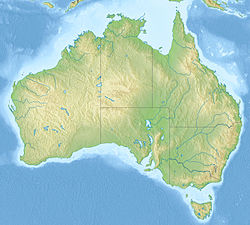2012 Gippsland earthquake
| UTC time | 2012-06-19 10:53:29 |
|---|---|
| ISC event | 604029463 |
| USGS-ANSS | ComCat |
| Local date | 19 June 2012 |
| Local time | 20:53:29 AEST |
| Magnitude | 5.2 Mw(USGS) 4.9 ML[1] |
| Depth | 10.0 km (6.2 mi) |
| Epicenter | 38°18′14″S 146°12′00″E / 38.304°S 146.200°E |
| Areas affected | Australia |
| Max. intensity | MMI VII (Very strong) |
| Aftershocks | >60 |
| Casualties | 0 |
A magnitude 5.2 earthquake struck Gippsland near Moe at 8.55 pm on 19 June 2012, at a shallow depth of 10.0 km.[2] It was the strongest recorded in Victoria in at least three decades,[3][4] with some sources suggesting it was the strongest in over a century.[5][6] It was felt across much of Victoria and parts of New South Wales, with strong shaking reported across the state capital, Melbourne. Some minor building damage was reported in the Latrobe Valley close to the epicentre, and in the eastern suburbs of Melbourne. Around 30 requests for help were made to the SES, mainly due to cracked walls and ceilings,[7] and a number of local businesses lost some stock.[8] Power outages occurred in some homes, but no significant reports of gas leaks were reported.[9] Approximately 60 aftershocks were recorded the following day, but most of these were not felt.[10]
A magnitude 4.3 Mw aftershock occurred in the same area at 7.11 pm on 20 July 2012 at a similar depth. This tremor was felt across south Gippsland, as well as Melbourne and the Mornington Peninsula.[11] This aftershock was the strongest of over 200 that occurred since the initial quake.[12]
See also
[edit]References
[edit]- ^ Attanayake, Januka; Sandiford, Dan; Schleicher, Lisa S.; Jones, Abraham; Gibson, Gary; Sandiford, Mike (2019), "Interacting Intraplate Fault Systems in Australia: The 2012 Thorpdale, Victoria, Seismic Sequences" (PDF), Journal of Geophysical Research: Solid Earth, 124 (5): 4673–4693, Bibcode:2019JGRB..124.4673A, doi:10.1029/2018JB016945, hdl:11343/297442, S2CID 135243134
- ^ ANSS: Australia 2012 (accessed 23 November 2018).
- ^ "Scientists investigate Victorian earthquake". Geoscience Australia. 21 June 2012. Archived from the original on 23 June 2012. Retrieved 26 June 2012.
- ^ Michael, Erin (20 June 2012). "Largest earthquake in three decades rocks Victoria". The Daily Telegraph. Retrieved 26 June 2012.
- ^ Paredes, Arlene (20 June 2012). "Melbourne Earthquake: Large and Shallow, Biggest in Victoria in over 100 Years". International Business Times. Archived from the original on 23 June 2012. Retrieved 26 June 2012.
- ^ Turnbull, Jeff; Nolan, Kellee (19 June 2012). "Biggest quake in a century rocks Victoria". The Sydney Morning Herald. Australian Associated Press. Retrieved 26 June 2012.
- ^ "No injuries reported after earthquake". Victoria State Emergency Service. 20 June 2012. Archived from the original on 4 April 2014. Retrieved 26 June 2012.
- ^ "Shop owners inspect damage from Vic quake". 9news.com.au. Australian Associated Press. 20 June 2012. Retrieved 26 June 2012.[permanent dead link]
- ^ "Magnitude-5.4 quake shakes southern Victoria". Australia: ABC News. 19 June 2012. Retrieved 28 February 2022.
- ^ Hernandez, Vittorio (21 June 2012). "Melbourne Earthquake Causes Superficial Damage to Victoria Buildings". International Business Times. Archived from the original on 23 June 2012. Retrieved 26 June 2012.
- ^ ANSS. "Australia 2012a: M 4.6 – near the southeast coast of Australia". Comprehensive Catalog. U.S. Geological Survey.
- ^ "Earthquake shakes Victoria". Archived from the original on 21 July 2012. Retrieved 20 July 2012.
External links
[edit]


